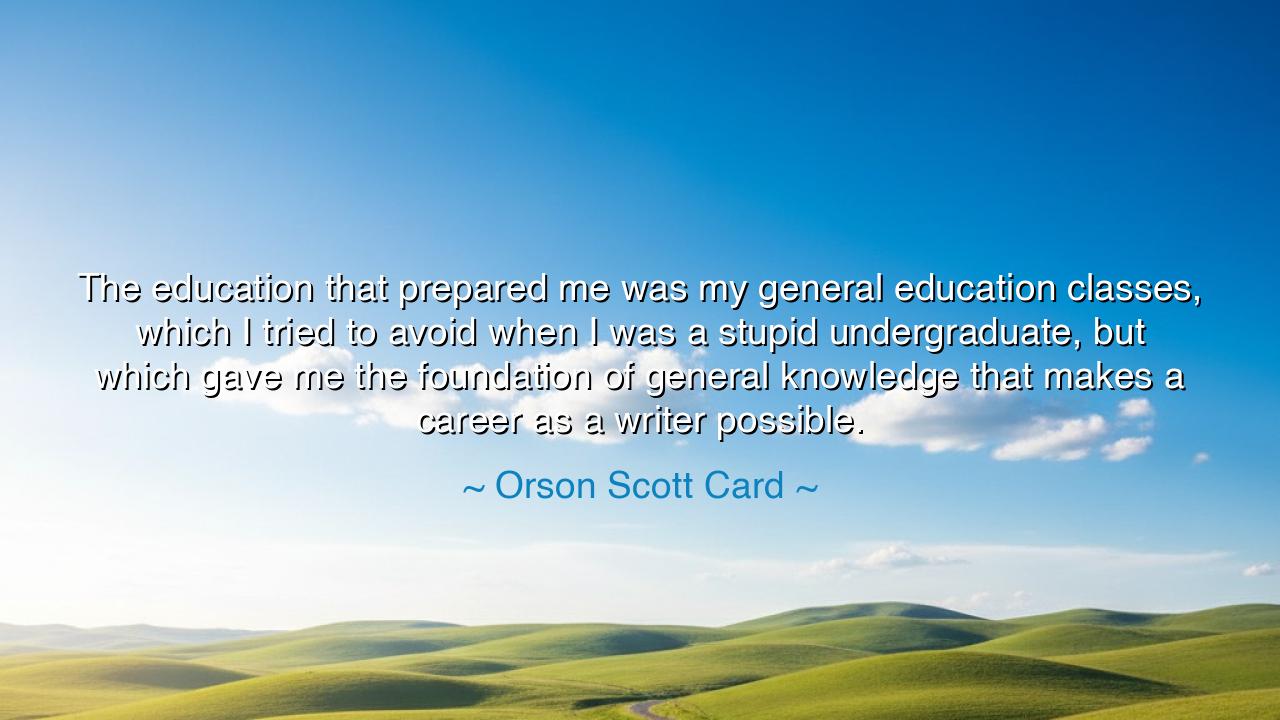
The education that prepared me was my general education classes
The education that prepared me was my general education classes, which I tried to avoid when I was a stupid undergraduate, but which gave me the foundation of general knowledge that makes a career as a writer possible.






The words of Orson Scott Card, author of Ender’s Game and master of speculative fiction, carry with them both humility and hard-won truth: “The education that prepared me was my general education classes, which I tried to avoid when I was a stupid undergraduate, but which gave me the foundation of general knowledge that makes a career as a writer possible.” Here he confesses what many young minds resist—that the very subjects we dismiss as tedious or irrelevant may one day become the stones upon which our future is built. In this recognition, he speaks not only for himself but for all who find, too late, that wisdom was hidden in the very places they first ignored.
The origin of this insight lies in Card’s own journey as a student and author. Like many undergraduates, he sought to follow only the path that interested him, disregarding the broader education offered by history, science, philosophy, and the arts. Yet, as he grew into a writer, he discovered that it was precisely this general knowledge—these fragments of culture, these glimpses into the sciences, these voices of ages past—that gave him the breadth of vision to craft rich worlds and believable characters. Without that foundation, his imagination would have been narrow; with it, he could weave stories that touched the depth of human experience.
History confirms this truth. Consider Leonardo da Vinci, whose genius was not confined to one discipline but flowed from his curiosity about anatomy, mechanics, painting, and nature itself. His greatness as an artist and inventor was born not from specialization alone, but from a foundation of general knowledge that connected all things. Or think of Winston Churchill, whose speeches stirred nations. His skill as an orator and statesman was rooted not merely in politics but in the literature and history he studied in his youth. Their lives reveal what Card discovered: that true mastery in any field requires a wide base of knowledge drawn from many disciplines.
O seekers of wisdom, remember this: the foundation is often invisible when we are building it, but it carries the weight of all that will come. The student who complains of mathematics, literature, or history may one day realize that these disciplines trained the mind to think, to question, to see patterns, to imagine possibilities. The writer especially needs this breadth, for to tell stories of the human condition, one must know something of humanity’s history, its science, its struggles, and its dreams. To skip this training is to weaken the very structure of one’s life’s work.
Card’s words also warn us of the arrogance of youth—the “stupid undergraduate” who thinks he knows what is necessary and what is not. This arrogance blinds many to the treasures placed before them. The ancients understood better. Plato insisted that philosophy required the study of mathematics; Confucius taught that the cultivated man must study poetry, history, and ritual. For the mind that is too narrow cannot see truth in its fullness. Education is not the gathering of tools for one career, but the shaping of the whole soul.
The lesson for us is clear: do not despise the breadth of learning. Do not imagine that what seems irrelevant today will not one day prove vital. For life is unpredictable, and the skills and knowledge we once scorn may become the very wings by which we rise. The writer, the leader, the scientist, the teacher—all need the wide soil of general knowledge in which to root their growth. Without it, their work will be shallow; with it, it will endure.
Practical action lies before you: if you are a student, embrace your general education with gratitude. Read beyond your field. If you are no longer in school, cultivate curiosity: pick up books in history, philosophy, and science. Allow yourself to be shaped by disciplines not your own. For each piece of knowledge is like a seed, and though it may lie dormant for years, one day it may blossom into insight, inspiration, or wisdom.
Thus let Orson Scott Card’s words endure as both confession and counsel: “The education that prepared me was my general education classes… which gave me the foundation of general knowledge that makes a career as a writer possible.” Take them to heart, for the foundation you build today—though unseen—will one day bear the weight of your destiny.






AAdministratorAdministrator
Welcome, honored guests. Please leave a comment, we will respond soon